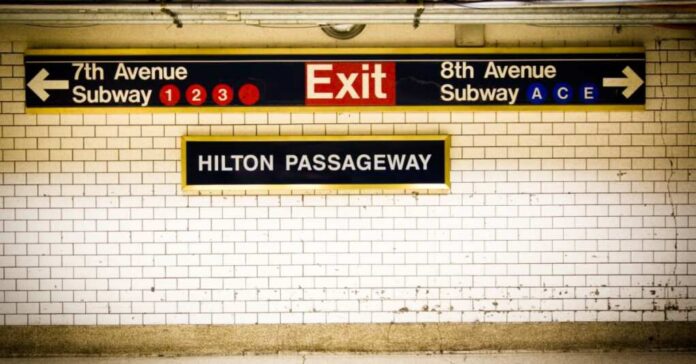
Well, hold onto your MetroCards, folks, because Governor Kathy Hochul just dropped a bombshell: She’s sending in the cavalry—750 National Guard members, no less—to the New York City subway system. In a surprising move, New York Governor Kathy Hochul, a Democrat, unveiled this latest plan in an attempt to curb the high crime rate in NYC.
Or maybe it’s not so surprising, as it’s an election year, and politicians are suddenly tripping over themselves to come up with “bold” solutions to problems that have been festering for ages. And let’s just be honest: nothing screams, “I’m fixing things,” like summoning the National Guard to patrol the subway.
Their mission? To assist the New York Police Department in conducting random bag checks for weapons following a spate of high-profile crimes on city trains. Because nothing screams “welcome aboard” like a uniformed soldier giving your backpack the once-over during rush hour, right?
According to a New York Times analysis, in mid-2022, the number of violent crimes reported per one million subway rides was approximately one. However, this comes in response to the last few months that have seen an increase in violent crime in the subway system, including three killings.
Hochul emphasized the deterrent effect, suggesting that potential wrongdoers might reconsider their actions, knowing an expanded security force could scrutinize their bags. She presented this initiative as part of a broader strategy to tackle subway crime, including proposals such as banning individuals convicted of assaulting subway passengers from trains for three years and installing cameras in conductor cabins to safeguard transit workers.
This deployment of the National Guard supplements an already heightened presence of NYPD officers in the subway network. Additionally, Hochul announced plans to dispatch 250 state troopers and police officers from the Metropolitan Transportation Authority to assist with the bag searches.
The governor’s aggressive approach to public safety comes in response to heightened concerns about crime, particularly after Republicans made significant gains in House races around New York City during the 2022 elections.
However, Donna Lieberman, executive director of the New York Civil Liberties Union, criticized the plan, calling it an instance of government overreach and an overreaction. Lieberman cautioned against misrepresenting isolated incidents as a widespread crime wave and warned against reverting to failed policing strategies of the past. “Sound policy making will not come from overreacting to incidents that, while horrible and tragic, should not be misrepresented as a crime wave and certainly don’t call for a reversion to failed broken windows policies of the past,” she said.
Despite Hochul’s efforts, statistics show a decline in overall crime in New York City since the peak during the COVID-19 pandemic, with reductions in killings reported on the subway system. Nonetheless, rare but shocking incidents, like fatal shootings and assaults, continue to unsettle residents. For instance, just last week, a passenger slashed a subway conductor’s neck, leading to train delays.
Random bag checks have been a part of the security protocol at subway entrances in New York for some time now. However, their implementation has been inconsistent across different stations and routes. These checks are conducted at random to ensure the safety of commuters and to prevent the entry of any dangerous or illegal items that could pose a threat to public safety.
Passengers are within their rights to refuse the searches and leave the station. There has been much debate about the effectiveness of certain tactics used in the subway system, which serves over 3 million riders daily, with critics raising doubts about whether such measures actually enhance public safety.











